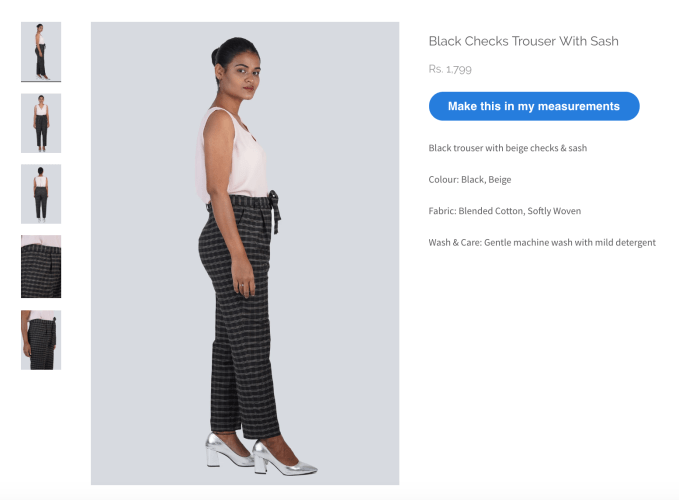Delayed tariffs would impact women's clothing more than men's: report - Fox Business |
- Delayed tariffs would impact women's clothing more than men's: report - Fox Business
- YC-backed startup Binks can ship custom-made clothing to Indian women in just three days - TechCrunch
- Texas-based women's clothing chain shutters 3 stores in Austin - CultureMap Austin
- Women's apparel retailer Avenue to close all of its stores: report - PennLive
| Delayed tariffs would impact women's clothing more than men's: report - Fox Business Posted: 13 Aug 2019 09:54 AM PDT  USTR delays tariffs on certain productsFBN's Edward Lawrence on the United State Trade Representative's decision to delay tariffs on certain products and what it means for U.S. trade negotiations with China. Tariffs on Chinese goods that had been scheduled to go into effect on Sept. 1 have been delayed until Dec. 15. Continue Reading Below Women will be even more impacted than men by the tariffs, The Wall Street Journal reported Tuesday. The pending tariffs would include apparel -- imported women's and girl's clothing is valued at more-than-twice the value of imported men's and boy's clothing. Certain footwear and clothing items are among the goods, which will be tariffed in December, the U.S. Trade Representative announced. Despite the delay, women could still face a greater impact than men once the tariffs do go into effect, if retailers pass on the costs to shoppers. The Journal reported that 42 percent of women's and girl's clothing imported to the U.S. last year came from China, compared to just 26 percent of men's and boy's clothing. MORE FROM FOXBUSINESS.COMThe average household spends about $665 per year on women's and girls' apparel and $427 on apparel for men and boys, according to the report. Advertisement Of course, not all clothing purchases would be affected by the tariffs. A higher percentage of the $400 billion Americans spent on clothing and footwear last year went to goods made in nations other than China, according to the report. The tariffs could force retailers to change their supply chains, according to Jonathan Gold of the National Retail Federation. That isn't a quick thing to do. "That means American families are ultimately going to pay more for goods they can't do without," he said last week. Women's clothing already has higher tariffs than men's clothing as it is. A U.S. International Trade Commission report found that, as of 2015, women's clothing had average tariffs at 14.9 percent, compared to 12 percent for men's clothing. Most of the tariffs put in place on Chinese goods so far in the U.S.-China trade war haven't been placed on goods sold directly to consumers. The now-delayed round of tariffs would have put added costs on imports of electronics like cellphones, laptops and video game consoles, as well as shoes and clothes. CLICK HERE TO GET THE FOX BUSINESS APP However, other goods on the $300 billion list of items imported from China will still face new tariffs on Sept. 1, according to the trade representative's office. |
| Posted: 31 Jul 2019 12:00 AM PDT Binks is a custom clothing startup created after co-founder and CEO Aamna Khan realized how frustrating it is to find well-fitting women's workwear in Indian cities. Currently participating in Y Combinator's accelerator program, Binks solves the problem by using computer vision and machine learning to provide customers with clothing sewn to their measurements, shipped in just three days. Khan says shopping online is often difficult because a standardized Indian sizing chart hasn't been developed yet. Clothing companies use a mix of U.S. and European size charts, often resulting in inaccurate sizing (Khan tells TechCrunch that the return rate for apparel ordered online in India can be as high as 30% to 40%, mostly because of fit issues). In big cities like Bangalore, where the company is based, there are a lot of tailors, but getting clothing fitted and sewn is a time-consuming process. "The tailoring market has not moved with the times, so the experience of getting something tailored is the same as it was 10 years ago. You have to buy fabric, give your measurements to the tailor, then there are usually a couple of fittings, and all of this means physically visiting the shop," Khan says. "It's very tedious for Indian women who are leading a busy life but still want well-fitting clothes." Many Indian customers buy ready-made clothes and have them altered by a tailor or accept that if they order clothing online, a lot of it will need to be returned or exchanged. Companies that figure out a better way to sell clothing to women, however, stand to profit a lot. The women's apparel market in India is worth $30 billion already and expected to grow quickly, becoming bigger than the men's apparel market by 2025, according to research by Avendus Capital. In a statement to TechCrunch, Adora Cheung, Binks' Y Combinator partner, said "Indian fashion commerce looks very similar to the US today, with its high return rates and dead stock. Thanks to the inexpensive tailoring market in its backyard, India can look really different and we're excited about that." To order custom clothes, customers pick a style on Binks' site (the average price of a garment is about USD $30) and fill out a form that includes questions about their height and bra size, what brands of tops and pants fit them best and which sizes from those brands they usually wear. Customers are also prompted to upload full-length photos of themselves taken from the front and side. Then a Binks consultant calls to discuss customizations before the order is finalized. Binks uses computer vision to read body measurements, and combines them with the customer's answers to customize clothing patterns. Orders are currently made by a single tailoring unit in Bangalore, but Binks' plan is to automate pattern making, as many tailors still draft patterns by hand, so the company can maintain a standardized process for sizing and quality control as it scales up. Binks is run by Khan, an experienced product manager, and co-founder Raj Vardhan, a data scientist. The two spent three years working together at online payments company Simpl before leaving to found the startup. After hosting physical pop-up stores in Bangalore, the company started taking online orders in June, and since then sales have doubled month over month, with 30% of customers placing a second order within the first month and a return rate of less than 1%, Khan says. Binks takes a similar approach to RedThread, an American startup that also uses body scanning technology and algorithms to make customizing clothing more efficient. For the Indian market, Khan says Binks faces several specific challenges. For example, even though the National Institute of Fashion Technology is currently conducting a survey to create a standardized clothing chart for India, it won't be ready for several years, so there isn't an existing data set of Indian women's measurements on which to train Binks' algorithms. Brands use a mix of American and European standard sizing charts and many Indian women prefer looser clothing, making it even more difficult to accurately describe a garment's fit online. As more customers place orders, that will help make Binks' technology be more accurate, Khan says. The next step is developing technology to streamline the tailoring process. "We plan to make it super accurate and then at the next level scale it. We want to organize the dressmaking process in a way that has not been done using technology," says Khan. "We want to automate it so that once a customer has selected a product, a pattern is produced and cutting is automated, so this reduces the turnaround time." |
| Texas-based women's clothing chain shutters 3 stores in Austin - CultureMap Austin Posted: 14 Aug 2019 07:07 AM PDT A year after filing for Chapter 11 bankruptcy protection, San Antonio-based fast-fashion brand A'Gaci is closing. On August 8, the womenswear retailer announced that it was shuttering all 54 of its stores in the U.S. and Puerto Rico, including three remaining stores in Austin. According to a release, all stores began liquidating product with a 50 percent-off sale starting August 8. Although no exact closure date has been established, the company expects most stores to wrap up by the end of August due to the busy back-to-school shopping season. The Austin stores closing include locations in the Domain, Barton Creek Square Mall, and Lakeline Mall. The company also shuttered its online store on August 1 in anticipation of its final chapter. It is still honoring returns on non-final sale merchandise purchased 30 days prior to that date. A'Gaci was founded in 1971 in San Antonio and quickly became a mall staple. Although its affordable, body-conscious clothing has a considerable following among fashion bloggers and Instagram influencers, a series of missteps ultimately led to its downfall. First was a poorly timed, 21-store expansion between 2016-2017. As customer shopping habits shifted online, major debts were maturing and profitable stores in Texas, Florida, and Puerto Rico took a hit from major hurricanes, according to the first bankruptcy filing. At the time of the 2018 restructuring, A'Gaci closed 20 of its locations and renegotiated several leases. The move, however, was not enough to make the company profitable. As of closure announcement, it was more than $6 million in debt. |
| Women's apparel retailer Avenue to close all of its stores: report - PennLive Posted: 13 Aug 2019 02:49 PM PDT  A women's apparel retailer with a store in the Mechanicsburg area plans to close all of its stores, according to a report. Employees of the fashion retailer, Avenue were told in a conference call last week that the retailer plans to close all of its stores in the coming weeks, according to a RetailDive report. The company has not publicly announced its plans to close its store and wouldn't confirm the closings to the retail website, but employees were told of the liquidation during the call and were instructed not to accept customer returns or sell gift cards, the report said. On Tuesday, at the retailer's store in Hampden Township at 35 Gateway Drive in Gateway Square, there were no signs at the store about an impending closing but, sale signs at the store indicate that everything in the store is 30 percent off. The chain was founded in 1983 and sells plus-sized clothing from sizes 14 to 32. The Avenue has around 300 stores, according to its website. In Pennsylvania, there are seven stores in the Blawnox, Bensalem, Mechanicsburg, Bethel Park, Wilkes-Barre, Plymouth Meeting and Baden area. The Avenue will be the latest in a long line of retailer closings. So far this year, U.S. retailers have announced 7,673 store closures, compared to 5,864 closures all of last year, according to Coresight Research which tracks news about store closures, openings and bankruptcies. |
| You are subscribed to email updates from "womens clothing" - Google News. To stop receiving these emails, you may unsubscribe now. | Email delivery powered by Google |
| Google, 1600 Amphitheatre Parkway, Mountain View, CA 94043, United States | |




0 Yorumlar